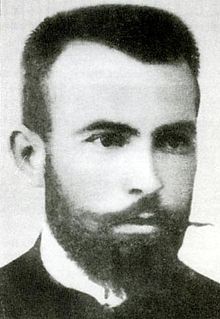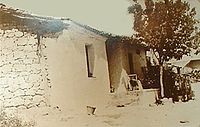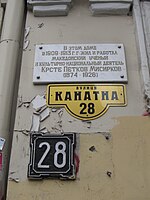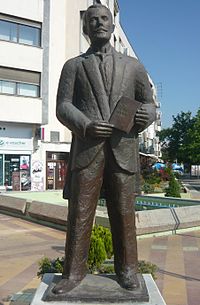Krste Misirkov
Krste Petkov Misirkov | |
|---|---|
 Portrait of Krste P. Misirkov | |
| Born | Krste Petkov Misirkov 18 November 1874 Postol, Ottoman Empire |
| Died | 26 July 1926 (aged 51) Sofia, Kingdom of Bulgaria |
| Pen name | "K. Pelski", "Sekol" |
| Occupation | philologist, teacher, historian, ethnographer, translator and professor. |
| Citizenship | Ottoman, Moldavian, Russian, Bulgarian |
| Education | Doctor's degree of philology and history |
| Alma mater | Faculty of philology and history at the University of Saint Petersburg |
| Genre | history, linguistics, philology, politics, ethnography and analytics. |
| Subject | history, language and ethnicity |
| Notable works | On Macedonian Matters |
| Spouse | Ekaterina Mihaylovna - Misirkova |
| Children | Sergey Misirkov |
| Signature | |
 | |
Krste Petkov Misirkov (
In the period between 1903 and 1905, he published a book and a scientific magazine in which he affirmed the existence of a Macedonian national identity separate from other Balkan nations, and attempted to codify a standard Macedonian language based on the central Western Macedonian dialects. A survey conducted in the Republic of Macedonia (now North Macedonia) found Misirkov to be "the most significant Macedonian of the 20th century".[3] For his efforts to codify a standard Macedonian language, he is often considered "the founder of the modern Macedonian literary language".[4]
On the other hand, he was one of the founders of the
Because Misirkov expressed conflicting views about the national identity of the Macedonian Slavs at different points in his life, his national affiliation and legacy remain a matter of dispute between
Biography

Early years
Krste Petkov Misirkov was born on 18 November 1874 in the village of
Misirkov in Serbia and Bulgaria
For a period, Misirkov studied in Serbia. Soon after he realized that the promotion of pro-Serbian ideas and propaganda was the main goal of the education provided by the Society of St. Sava.[7] The politics practiced by the association forced Misirkov and the other Macedonian students to participate in a students protest and revolt against the Society of St. Sava. As a result, Misirkov and other companions moved from Belgrade to Sofia. He then faced a similar situation in Bulgaria, this time being confronted with pro-Bulgarian propaganda.[7] Misirkov again went to Serbia to continue his education, but without any success as he was rejected by the Society of St. Sava, most likely for his part in the protests conducted against it. Since he was willing to get higher education, he was forced, by a chain of events, to enroll in a theological school for teachers. Similar to the Society of St. Sava, this school as well had its own propagandistic goals which resulted in another revolt of the students.[11] As a result of it, the school ended its programs and the students were sent throughout Serbia. Misirkov was sent to Šabac, where he finished his fourth secondary education course, but this time in the local gymnasium, which happened to be his last course.[10] In both Serbia and Bulgaria, Misirkov and his friend were treated as Serbs or Bulgarians[7][10] in order to be accepted in the educational system. After the gymnasium, even though he graduated, Misirkov enrolled in another secondary school for teachers in Belgrade, where he graduated in 1895. During this time, particularly in 1893, Misirkov became a member of an association of Macedonian students called "Vardar".[12]
Misirkov in the Russian Empire
His qualifications obtained in Belgrade were not recognized in
On November 15, 1900, Misirkov, a third-year student in the Faculty of History and Philosophy at the time, and other students in Russia created a students' circle in Saint Petersburg. The main objective of the circle was the political autonomy of the



Later Misirkov abandoned the university and left for
Return to Ottoman Macedonia
Facing financial obstacles to continue his postgraduate education, he accepted the proposal of the
Return to Russian Empire
In 1905, he left Saint Petersburg for
When the
At that point, Misirkov made contacts with the
After the outbreak of the First World War in 1914, Bessarabia became a democratic republic, and he was elected a member of the local parliament Sfatul Țării as a representative of the Bulgarian minority. At the same time, Misirkov worked as a secretary in the Bulgarian educational commission in Bessarabia.[25] In March 1918, unification between Bessarabia and Romania was declared. On 21 May 1918, Misirkov openеd a Bulgarian language course in Bolhrad. Misirkov proceeded to take a clandestine trip to Bulgaria in order to procure textbooks for the students, but after his return in November, he was arrested by the Kingdom of Romania authorities, still at war with Bulgaria and was extradited to Bulgaria.
Last years in Bulgaria

After being expelled by the Romanian authorities, Misirkov returned to
Works
In his life, Misirkov wrote one book, one diary, published one issue of a magazine and wrote more than thirty articles. His book On the Macedonian Matters was published in Sofia in 1903. The magazine was called Vardar and was published in 1905 in Odessa, Russian Empire. The articles that Misirkov wrote were published in different newspapers and focused on different topics. The book, magazine and a number of his article were written in the Central Macedonian dialects, which are the basis of Modern Macedonian.



On the Macedonian Matters
One of the most important works of Misirkov is the Macedonian book
Vardar magazine
Misirkov was the author and editor of the first scientific magazine in Macedonian.[35] The magazine Vardar was published in 1905 in Odessa, Russian Empire. The magazine was published only once, because of the financial problems that Misirkov had been facing with at that time. He expressed views about the national distinctiveness of the Macedonians.[12] According to Blaže Ristovski, its orthography was almost the same as the orthography of standard Macedonian.[36] The magazine was meant to include several different scientific disciplines, mostly concerned with Macedonia.
Articles
During his life, Misirkov published many articles for different newspapers and magazines. The articles deal with Macedonia, Macedonian culture, ethnology, politics and nation on one hand and with the Bulgarian nation, politics and ethnography on the other. Misirkov published his articles in Macedonian, Russian and Bulgarian and he published them either in Russia or in Bulgaria. Most of the articles were signed by his birth name, but there are articles that are signed with his pseudonym K. Pelski.
Diary
In 2006, a handwritten diary by Misirkov written during his stay in Russia in 1913 was discovered. It was declared authentic by Bulgarian and Macedonian experts and was published in 2008.
Dialectology and ethnography
In several publications, Misirkov made an attempt to determine the border between the
Legacy
During the second half of the 19th century and the beginning of the 20th century, the idea of a separate Macedonian ethnicity was as of yet promoted by small circles of intellectuals.

View of Misirkov in Bulgaria
In Bulgaria, Misirkov is regarded as a controversial educator with scientific contribution to Bulgarian dialectology and ethnography. He graduated from the
View of Misirkov in North Macedonia
In
There is a debate about Misirkov's ethnicity in North Macedonia issued by Dr. Rastislav Terzioski, who brought to light memos from Russian archives which clearly stated his
See also
Notes
- ^ Орган Историјског института, Српске академије наука и уметности · 38. том (1992). "Историјски часопис": 290.
{{cite journal}}: Cite journal requires|journal=(help)CS1 maint: numeric names: authors list (link) - ^ Михайлов, Иван. "Истинският образ на неуравновесения Кр. Мисирков".
- ^ a b http://star.dnevnik.com.mk/default.aspx?pBroj=1884&stID=4305 Македонија мора да го има Крсте Мисирков во своите пазуви Archived 21 September 2012 at the Wayback Machine
- ISBN 0-691-04356-6.
- ISBN 9789548247160; стр. 14
- ISBN 900439429X
- ^ a b c d e f g h Giorgio Nurigiani (1972). "The Macedonian Genius Through the Centuries". D. Harvey Publishers. pp. 160–176. Retrieved 27 April 2023.
- ISBN 1850655340, p. 63.
- ISBN 3034301960, p. 66.
- ^ a b c d Literature of the Macedonian language, Georgi Stalev, Skopje
- ^ ISBN 9786155211942.
- ^ Мир, XXXI, бр. 7476 от 26 май 1925
- ^ a b "Проф. д-р Веселин Трайков – "Кръсте П. Мисирков и за българските работи в Македония", София, 2000, Издателство "Знание"". Archived from the original on 18 July 2012. Retrieved 20 February 2013.
- ^ "НБКМ-БИА, ф. 224, Върховен македоно-одрински комитет, София, а.е. 23, л. 397 За (SS. Cyril and Methodius National Library-Bulgarian historical archive, facsimile 224, Supreme Macedonian-Adrianople Committee, Sofia, а.е 23, sheet 397 3a)". Archived from the original on 28 April 2013. Retrieved 19 February 2013.
- ISBN 978-1-85065-534-3.
- ISBN 978-0-8108-6295-1.
- ^ a b Георги Маргаритов. В Скопие продължават да показват само едното лице на Кръсте Мисирков. в-к "Македония", брой 10, 10 март 1999 г.
- ISBN 978-0-275-97648-4.
- ^ ISBN 978-3-8258-1387-1.
- ^ К. Мисирков. "БЕЛЕЖКИ ПО ЮЖНОСЛАВЯНСКАТА ФИЛОЛОГИЯ И ИСТОРИЯ /КЪМ ВЪПРОСА ЗА ПОГРАНИЧНАТА ЛИНИЯ МЕЖДУ БЪЛГАРСКИЯ И СРЬБСКО-ХЪРВАТСКИЯ ЕЗИЦИ И НАРОДИ/“ Българска сбирка, XVII, януари 1910, кн. 1, с. 39–42; февруари 1910, кн. 2, с. 100; маи 1910, кн. 5, с. 328; г. XVIII, март 1911, кн. 3, с. 197; април 1911. кн. 4, с. 265–267.
- ^ The South Slav Epic Legends on the Marriage of King Volkashin in Connection with the Reasons for the Popularity of Marko Kralé amongst the South Slavs (Odessa, 1909).
- ^ Крсте Петков Мисирков Записки за България и Руско-Българските отношения: бележки за събитията на деня (5 юли-30 август 1913 г.) редактор Цочо Василев Билярски, "Анико", 2011, ISBN 954824716X, стр. 30.
- ^ "Болгария съ картов блгарскихъ железнихъ дорогъ и 44 илюстрациями (Предисловие переводчика)", Одеса, 1911 година
- ^ ISBN 9789546211774.
- ^ Н. Велев, Из политико-обществената дейност на Кръстю Петков Мисирков. Сп. „Исторически преглед”, кн. 5, 1968, с. 70–86.
- ^ К. П. Мисирков – дневник 5 юли – 30 август 1913, София-Скопие, 2008, Държавна агенция „Архиви“ на Република България-Държавен архив на Република Македония, стр. 168.
- ^ K. P. Misirkov – Diary 5 July to 30 August 1913, Sofia-Skopje, 2008, Published by State Agency "Archives" of the Republic of Bulgaria & State Archive of the Republic of Macedonia, p. 168
- ^ Промемория на Никола Трайков за разговор с проф. Петко Стоянов за Кръстю Мисирков, София, 8 март 1963 г Archived 30 September 2007 at the Wayback Machine.
- ISBN 978-0-8142-0913-4.
- ^ "ЦДИА, фонд № 177, Министерство на просвещението, опис № 2, а.е.230, л.22". Archived from the original on 30 September 2007. Retrieved 9 July 2007.
- ISBN 978-90-5201-297-1.
- ^ The Former Yugoslavia's Diverse Peoples: A Reference Sourcebook, Matjaž Klemenčič, Mitja Žagar, p. 74: This work on the Macedonian language was written in Central Macedonian dialect, which he also recommended as a basis for a future literary language
- ^
- "The term 'project' tackles likewise the specific temporal orientation of the initial stage of formation of Macedonian ethnic nationalism: the Macedonian self-determination is seen by Misirkov as a future ideal and his national manifesto on the Macedonian Matters (Sofia, 1903) recognizes the lack of actual correlation between the concept of Macedonian Slavic ethnicity and the real self-identifications of the majority of Macedonian Slavs. In a rather demiurgical way, Misirkov is the first who exposes the basic 'ethnographic' characteristics of what he regards as 'inexistent' but 'possible' and 'necessary' Macedonian Slavic ethnicity..." Tchavdar Marinov, "Between Political Autonomism and Ethnic Nationalism: Competing Constructions of Modern Macedonian National Ideology (1878–1913)", p. 3.
- "Misirkov lamented that "no local Macedonian patriotism" existed and would have to be created. He anticipated that Macedonians would respond to his proposal with a series of baffled questions: "What sort of new Macedonian nation can this be when we and our fathers and grandfathers and great-grandfathers have always been called Bulgarians? ... Macedonian as a nationality has never existed, they will say, and it does not exist now." (...) Misirkov answered these objections by observing that national loyalties change with time: "What has not existed in the past may still be brought into existence later, provided that the appropriate historical circumstances arise." Misirkov, in short, wanted the Ottoman state to promote Macedonian nation-building, calling for "official recognition"(...)" Region, Regional Identity and Regionalism in Southeastern Europe, Klaus Roth, Ulf Brunnbauer, LIT Verlag Münster, 2008, ISBN 3825813878, p. 138.
- "The idea of a separate (Slavic) Macedonian nationhood most certainly had its antecedents before the 1930s – nor is that surprising, considering the political history of the area. Krste Misirkov, the "first creator of a clear and rounded representation, of argued and systematic conception about the national essence of Macedonian people," brought arguments in favor of Macedonian "national separatism" in his on Macedonian matters, but still considered the Macedonian question a part of a larger Bulgarian complex, if for no other reason than linguistic. Misirkov's pan-Bulgarian patriotism was based largely on the kinship of language, and his pan-Bulgarian positions, which he used, moreover frontally, against the Serbs and Greeks." The National Question in Yugoslavia: Origins, History, Politics, Ivo Banac, Cornell University Press, 1988, ISBN 0801494931, p. 327.
- "Misirkov speaks, for instance, of the relations between "the Macedonian peoples" [makedonckite narodi], of the "convergence of interests of all Macedonian peoples." The term "nation" appears rarely and is contrasted to the term "nationality": e.g., Misirkov suggests that, in Macedonia, there are many "nationalities" [nacionalnosti], while "a distinct Macedonian Slavic nation [naciia]" does not yet exist (p. 46). This usage actually implies that the "nation" is seen as a political phenomenon of a "higher" degree, transcending a multiplicity of actual ethnic and/or confessional particularities." We, the People: Politics of National Peculiarity in Southeastern Europe, Diana Mishkova, European University Press, 2009, ISBN 9639776289, p. 133.
- "Misirkov accepted that his project for Macedonian particularist nationalism broke with considerable Bulgarian sentiment. He admitted both that there was "no local Macedonian patriotism", and that ordinary Macedonians would see Macedonian particularism as a novelty: "What sort of new Macedonian nation can this be when we and our fathers and grandfathers and great-grandfathers have always been called Bulgarians?" Responding to these arguments, Misirkov showed a surprising acceptance that national communities evolve in response to events: "what has not existed in the past may still be brought into existence later, provided that the appropriate historical circumstances arise". Misirkov thus tried to create the appropriate historical circumstances." Sundry Macedonias, Alexander Mark Maxwell, University of Wisconsin—Madison, 1998, pp. 50–51.
- ^ Macedonia and Greece: The Struggle to Define a New Balkan Nation, John Shea, p. 204: "After the failure of the Ilinden rebellion, Misirkov returned to St. Petersburg, and in 1905 he launched the journal Vardar in Macedonian."
- ^ Вардар: научно-литературно и општествено-политичко списание на К. П. Мисирков (Vardar: scientific-literary and socio-political magazine of K. P. Misirkov), Blaže Ristovski, Institute of Macedonian language "Krste Misirkov", Skopje, 1966, p. 13.
- ^ Cvetanova, G. (2022). Reflections on Krste Misirkov’s theory: From ethnocultural entity to politically legitimate nation. Slavia Meridionalis, 22, Article 2672. p. 8.
- ^ That said, it is worth noting that Misirkov himself returned to a Bulgarian nationalist position by 1907, and his 1913 diary articulates explicit Bulgarianism. on p. 139 in: Al. Maxwell, “Slavic Macedonian Nationalism: From 'Regional' to 'Ethnic.'” Ethnologia Balkanica 11 (2007): 127–155.
- ISBN 9781475947038, p. 162.
- ^ ISBN 9781538119624, p. 208.
- ^ "Diary Reveals Father of Macedonian Nation Had Bulgarian Identity, Sofia News Agency, 23 April 2008, Wednesday". Archived from the original on 26 June 2008. Retrieved 10 August 2008.
- ISBN 9780429266362, p. 174.
- ^ See: Мисирков, Кръстьо (1898). Значението на моравското или ресавското наречие за съвременната и историческа етнография на Балканския полуостров. Български преглед, година V, книга І, стр. 121–127; Мисирков, Кръстьо (1910, 1911). Бележки по южно-славянска филология и история (Към въпроса за пограничната линия между българския и сръбско-хърватски езици и народи), Одеса, 30.XII.1909 г. Българска сбирка.
- ISBN 0-252-01711-0, University of Illinois Press.
- ISBN 978-0-19-152872-9.
- ^ Center for Documentation and Information on Minorities in Europe, Southeast Europe (CEDIME-SE) – "Macedonians of Bulgaria". Archived 23 July 2006 at the Wayback Machine
- ^ 154 Studia Theologica V, 3/2007, 147 – 176 Alexander Maxwell, Krste Misirkov's call for Macedonian Autocephaly: religious nationalism as instrumental political tactic.
- ISBN 978-0-7190-6605-4.
Macedonian nationalism is a new phenomenon. In the early twentieth century, there was no separate Slavic Macedonian identity
- ISBN 0-691-04356-6.
- ISBN 0-521-79708-X.
Despite the recent development of Macedonian identity, as Loring Danforth notes, it is no more or less artificial than any other identity. It merely has a more recent ethnogenesis – one that can therefore more easily be traced through the recent historical record.
- ISBN 978-0-19-924409-6.
Unlike the Slovene and Croatian identities, which existed independently for a long period before the emergence of SFRY Macedonian identity and language were themselves a product of federal Yugoslavia, and took shape only after 1944.
- ISBN 0-8014-9493-1, p. 327.
- ^ Църнушанов, Коста. Македонизмът и съпротивата на Македония срещу него. Унив. изд. "Св. Климент Охридски", София, 1992.
- ^ "Since the Bulgarian idea, as it is well-known, is deeply rooted in Macedonia, I think it is almost impossible to shake it completely by opposing it merely with the Serbian idea. This idea, we fear, would be incapable, as opposition pure and simple, of suppressing the Bulgarian idea. That is why the Serbian idea will need an ally that could stand in direct opposition to Bulgarianism and would contain in itself the elements which could attract the people and their feelings and thus sever them from Bulgarianism. This ally I see in Macedonism...." from the report of S. Novaković to the Minister of Education in Belgrade about "Macedonism" as a transitional stage in Serbianization of the Macedonian Bulgarians; see idem. Cultural and Public Relations of the Macedonians with Serbia in the XIXth c.), Skopje, 1960, p. 178.
- ^ Novaković initiated the establishment of closer Serbian-Russian relations as consul in St. Petersburg, where he supported the local Macedonists as Misirkov and Chupovski, see: Angel G. Angelov, The European Legacy: Toward New Paradigms, 1470-1316, Volume 2, Issue 3, 1997, Pages 411 – 417. and the Memoirs of Hristo Shaldev, Macedonian revolutionary (1876–1962), Macedonian Patriotic Organization "TA" (Adelaide, Australia, 1993), The Slav Macedonian Student Society in St. Petersburg, pp. 14–21.
- ISBN 954621177X, стр. 12.
- ^ Македонизмът и съпротивата на Македония срещу него Коста Църнушанов, Унив. изд. "Св. Климент Охридски", София, 1992 г. стр. 42.
- ^ д-р Растислав Терзиоски "За некои ставови на К. П. Мисирков за македонското прашање (дилеми и толкувања), Зборник на МАНУ "Делото на Крсте Мисирков“, том 1 од Меѓународниот собир по повод стогодишнината од излегувањето на книгата "За Македонцките работи“ (Скопје 2005), стр. 87–90.
- ^ "Култура, Сто години Илинден или сто години Мисирков? Чавдар Маринов, 30 April 2004". Archived from the original on 24 January 2023. Retrieved 4 May 2023.
- ^ Списание България – Македония, Брой 2, 2010 г. Неизвестният досега дневник на Мисирков разбуни духовете край Вардара, Светослав Делчев.
- ISBN 9786155211942.
- ISBN 9786068266145.
- ISBN 9789004261914.
- ^ Во суштина, целта на Терзиоски е искажана еден пасос каде што авторот констатира дека е оправдана и потребна „извесна преоцена на некои искажани ‘конечни вистини’ за делото и личноста на К. П. Мисирков“. Интересно е што тежнението за преоцената на „делото и личноста на Мисирков“ се појавува во сегашните времиња (сто години по објавувањето на „За македонцките работи“) и е базирано врз, главно, службени преписки (Терзиоски најчесто цитира официјални писма, напишани до руските официјалисимуси, некаде од 1911 до 1919 година), што секако не пречи уште во воведот на излагањето да биде констатирано дека „К. П. Мисирков своерачно се потпишува како македонски Бугарин; говори за неспорното бугарско население во Македонија...расправа за бугарското сознание на словенското население во Македонија...жали за нереализирањето на Санстефанските решенија...“ и така натаму. Како илустрација се даваат писмата на Мисирков до министерот за надворешни работи на Русија, каде што се апелира „македонските Бугари“ да се оттргнат од јаремот на „шумадиските свињари“, а поентира со тоа дека „никогаш нема да престанеме да се чувствуваме Македонци или што е едно те исто со македонски Бугари“. Во едно писмо од 1914 г., Мисирков вели, дека “Македонци значи единствено македонски Бугари”. Го обвинува рускиот конзул Ростковски, дека под српско влијание сметал македонското население само за “словенско” и вели дека тоа било заблуда под српско влијание. Тагува за поделената во Балканските војни Бугарија.” For more see: Растислав Терзиоски „За некои ставови на К. П. Мисирков за македонското прашање (дилеми и толкувања), Зборник на МАНУ „Делото на Крсте Мисирков“, том 1 од Меѓународниот собир по повод стогодишнината од излегувањето на книгата „За Македонцките работи“ (Скопје 2005), стр. 87–90.
- ^ Експерти: Нема дилеми за идентитет на Мисирков Archived 10 October 2010 at the Wayback Machine on a1.com.mk
- ^ "Виктор Цветаноски - Враќањето на Мисирков, но не оној што го знаеме, Утрински весник". Archived from the original on 15 September 2009. Retrieved 25 April 2008.
- ^ In 1914 Misirkov wrote: “…I’d use the words of Boris Sarafov, that we, the Macedonians are neither Serbs nor Bulgarians, but simply Macedonians…” (”The Macedonian and the Bulgarian national ideals", Macedonian voice, No. 10, Sankt Peterburg, 1914, pg. 11–14.); Д-p Блaжe Pиcтoвcки, "Kpcтe Мисирков (1874–1926) – прилог кон проучувањето на развитокот на македонската национална мисла, МАNU, Skopje, 1966.
External links
- Works
- Krste Misirkov – Misirkov's work on the Macedonian Wikisource. Complete text of his book, magazine and articles.
- Magazine "Vardar" on Wikisource. (in Macedonian)
- "On Macedonian matters" – complete text on Wikisource. (in Macedonian)
- "On Macedonian matters" – scan of the original book. (in Macedonian)
- "On Macedonian Matters" – complete text. (in Macedonian)
- Project: Krste Misirkov – online interactive site about Misirkov's life and work. (in Macedonian)
- "On Macedonian Matters" – complete text.
- Misirkov's diary – downloadable link. (in Macedonian)
- Works by Krste Misirkov at LibriVox (public domain audiobooks)

- General
- Biography of Krste Misirkov (in Macedonian and English)
- "Krste Misirkov also on the Bulgarian matters in Macedonia" by Veselin Trajkov (in Bulgarian)
- Signature of Krste Misirkov in his diary.
- A letter by Kole Nedelkovski to Sergej Misirkov regarding Krste Misirkov and his work.

